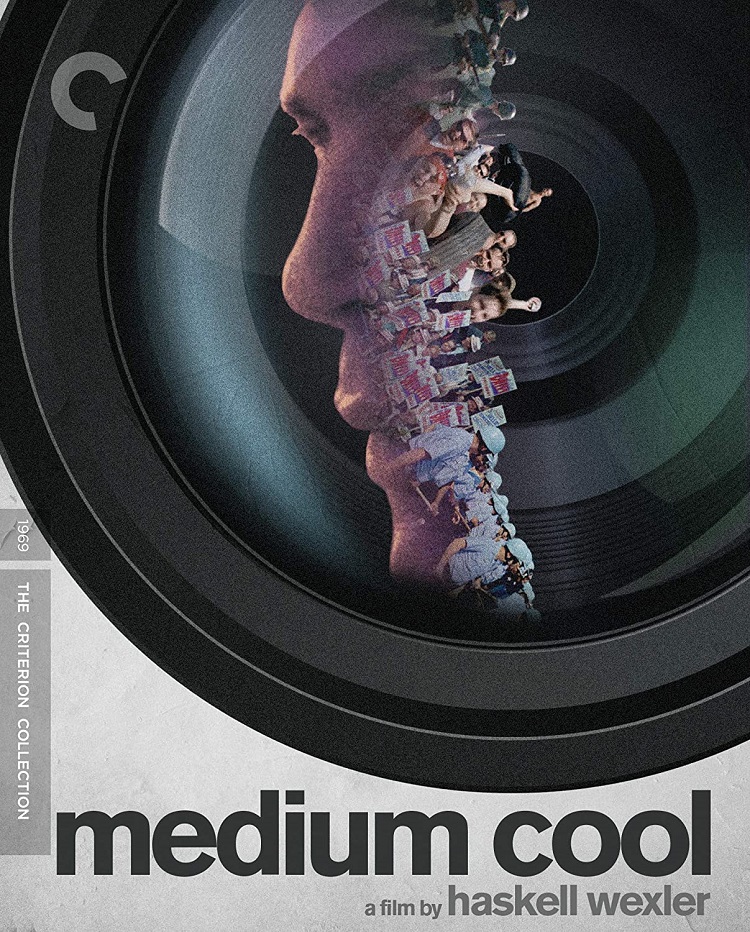
Written by Kristen Lopez
The Criterion Collection presents a slice of American history with director/cinematographer Haskell Wexler’s, Medium Cool. Filmed against the background of the 1968 Democratic National Convention, Medium Cool tells a shrewd and haunting condemnation on media interaction. In a time where our every thought is broadcast to the masses, Medium Cool explores the idea of documentation itself, and where social responsibility begins and ends. While the narrative isn’t nearly as fascinating as the real-life footage Wexler caught, Criterion has presented an equally fascinating presentation of footage. If you’re a history buff, particularly of our nation’s history, you’d do well to check out Medium Cool.
Cameraman John Cassellis (Robert Forster) spends his days capturing violence and racial tensions in the ghetto for a television station. When he meets a war widow (Verna Bloom) their relationship gets braided up within the rising social tensions, before culminating in a violent Chicago riot.
The late-1960s were a well-documented time of racial tension with the Vietnam War and the Civil Rights Movement butting heads, often violently. The title of the film comes from Marshall McLuhan’s comment that TV is a “cool” medium; the cooler the media, “the more someone has to uncover and engage in the media” in order to connect the dots. The opening image of Medium Cool introduces John as an unseen entity, mutely recording the devastation of a car wreck on a freeway. Whether there are people inside, alive or dead, isn’t shown because to the men recording they’re unimportant. It’s not until they announce “we have the coverage,” that they call the police. From there it segues into a lengthy discussion, expertly shot in tight, documentary fashion, about the nature and responsibility of the media. Each person interviewed has a differing opinion in a discussion that takes place to this day. The film sets out to ask what is the responsibility of a cameraman, and the media that runs the footage.
A key question is what is news, and when do you know something will become an indelible image. In doing some research on the film, director Haskell Wexler didn’t know how iconic the 1968 Democratic National Convention, and the ensuing riot (started by police), would become; he only knew that it was something that needed to be documented. Throughout the film, I questioned the relevance of the fictional story of Cassellis and his romance with Eileen, but once the final sequence starts and Eileen ends up in the midst of the riot (in a canary yellow dress of all things) the audience realizes that history isn’t something that you can plan ahead of time; Wexler shows us history being made, but maybe not for those experiencing it at the time. It’s a thought-provoking message that makes the viewer question what will be history ten or twenty years from now.
The fictional narrative is integral to the overall impact of the plot, but it’s not quite the visual gut-punch of the real events being filmed. Actors Robert Forster and Verna Bloom are strong, and have a chemistry that’s palpable, but I simply wanted more of what was going on at the time; I blame my love of 1960s American history. It’s not a deal-breaker, but if you want a straight documentary of events, the narrative does distract from the riveting real-life events.
The Criterion continues to spare no expense when it comes to presenting a comprehensive, and immersive, experience into the world of the film. The opening essay included with the disc discusses the world of 1968 America and why Wexler was so revolutionary. In terms of disc features there’s a brand-new video interview with Wexler discussing political climate of 1968. The nine-part documentary “Look Out Haskell, It’s Real!” is the showstopper worth watching immediately following the film. The sequences are extended excerpts from documentarian Paul Cronin’s doc of the same name combining interviews with the cast and crew, as well as historians. The documentary encompasses anything and everything you’d want to know about the film from it’s shooting to how it influenced and detailed the time period. Another Cronin documentary that’s used is in the feature “Harold Blankenship,” discussing the child actor who plays Verna Bloom’s son. It’s a short fifteen-minute piece but is fascinating in going over Blankenship’s life, both before and after the movie. “Medium Cool Revisited” puts the film right into events of today, featuring Wexler talking to the Occupy Wall Street movement in 2012. It’s another brief sequence but is interesting in showing how well the movie has aged. There are also two audio commentaries; one featuring Wexler, editorial consultant Paul Golding, and actress Mariana Hill recorded in 2001; the other is a newly recorded commentary with Paul Cronin. Each has individual pros and cons. I give the edge to the former simply because all the commenters create a strong dialogue. The disc also includes the film’s original trailer.
Medium Cool isn’t a movie you’ll want to pop in the Blu-ray player on a whim, but if you’re interested in media tactics and its role in our political processes, consider picking up and watching Medium Cool.